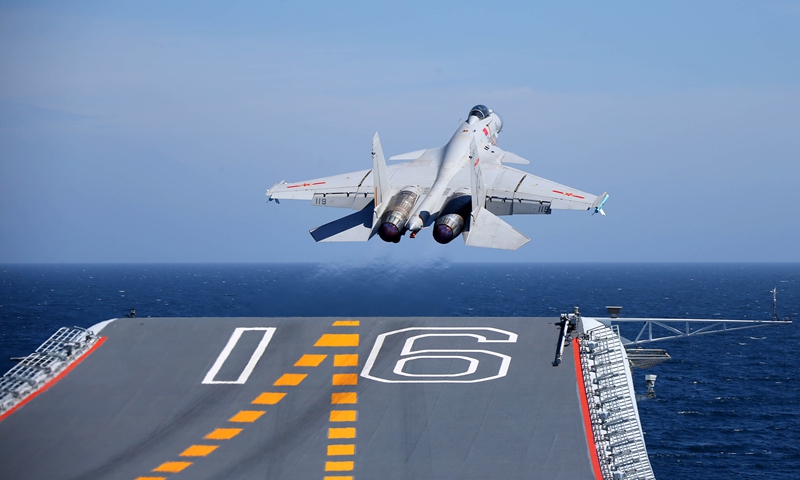
A J-15 carrier-borne fighter jet takes off from the flight deck of the aircraft carrier Liaoning during a maritime training exercise on July 1, 2017. The Chinese aircraft carrier Liaoning and its carrier strike group carried out realistic training in an undisclosed sea area on July 1, 2017. (eng.chinamil.com.cn/Photo by Li Tang)
China recently revealed an upgraded version of the J-15 ship-borne fighter jet that has just wrapped up test flights, with reports saying the new aircraft received enhancements in its missile pylons, the infrared search and track system, the radar and the wings.
The upgraded J-15, potentially capable of operating with catapults, will play key roles on both China's old and new aircraft carriers, experts said on Thursday.
Shenyang Aircraft Co, under the state-owned Aviation Industry Corp of China, on Tuesday published photos on its social media account, introducing its production work as the end of the year approaches.
One of the photos, showing a J-15 fighter jet taxiing on a runway under the assistance of a tug truck, attracted the attention of the media and netizens.
This J-15 has many differences compared with previous ones, and this means it is an upgraded version, eastday.com, a Shanghai-based news website, reported on Wednesday.
Judging from the photo, the new J-15 uses a new type of wingtip pylon - the same type as the J-16 fighter jet - to replace the older type, which was used on the J-11B fighter jet. The new type can carry China's most advanced short-range combat missile, the PL-10, while the previous version could only launch the older PL-8, the report said, noting that the PL-10 is much deadlier than the PL-8, as it can be launched as soon as the pilot sees the target, and it is very difficult to evade thanks to its extreme maneuverability and advanced infrared guidance.
The photo also shows that the infrared search and track systems in front of the cockpit and the front of the wings were changed, which could mean the avionics systems of the new J-15 were improved, eastday.com said.
Another major change is the difference in the radar, as the lightning diverter stripes on the new radome are not the same as the old one, the report pointed out.
This may mean that the upgraded J-15 could have switched to an advanced, active electronically scanned array radar system, which enables the use of China's most advanced PL-15 beyond-visual-range air-to-air missile, eastday.com said.
Since the tug truck was blocking part of the aircraft in the photo, it cannot be confirmed if the upgraded J-15 has eliminated the main pitot tube, or if its nose landing gear is reinforced to operate on a catapult, but it makes sense that it can be launched by catapult, considering China's third aircraft carrier, which is under construction, is expected to be equipped with catapults, analysts said.
The upgraded J-15 is likely a fourth-generation-plus fighter jet, up from the fourth generation, a Chinese military expert told the Global Times on Thursday, requesting anonymity.
It will likely be operable on both China's old aircraft carriers that use ski-jump ramps and new ones that use catapults, the expert predicted, noting that it will play key roles in both attack and air-to-air combat, and act together with China's upcoming fifth-generation carrier-based fighter jet and early warning aircraft.
In another article the Shenyang Aircraft Co released on Wednesday, the company said it had completed all production and test flights for 2021 as of that day, and it set record highs in producing and delivering aircraft.




